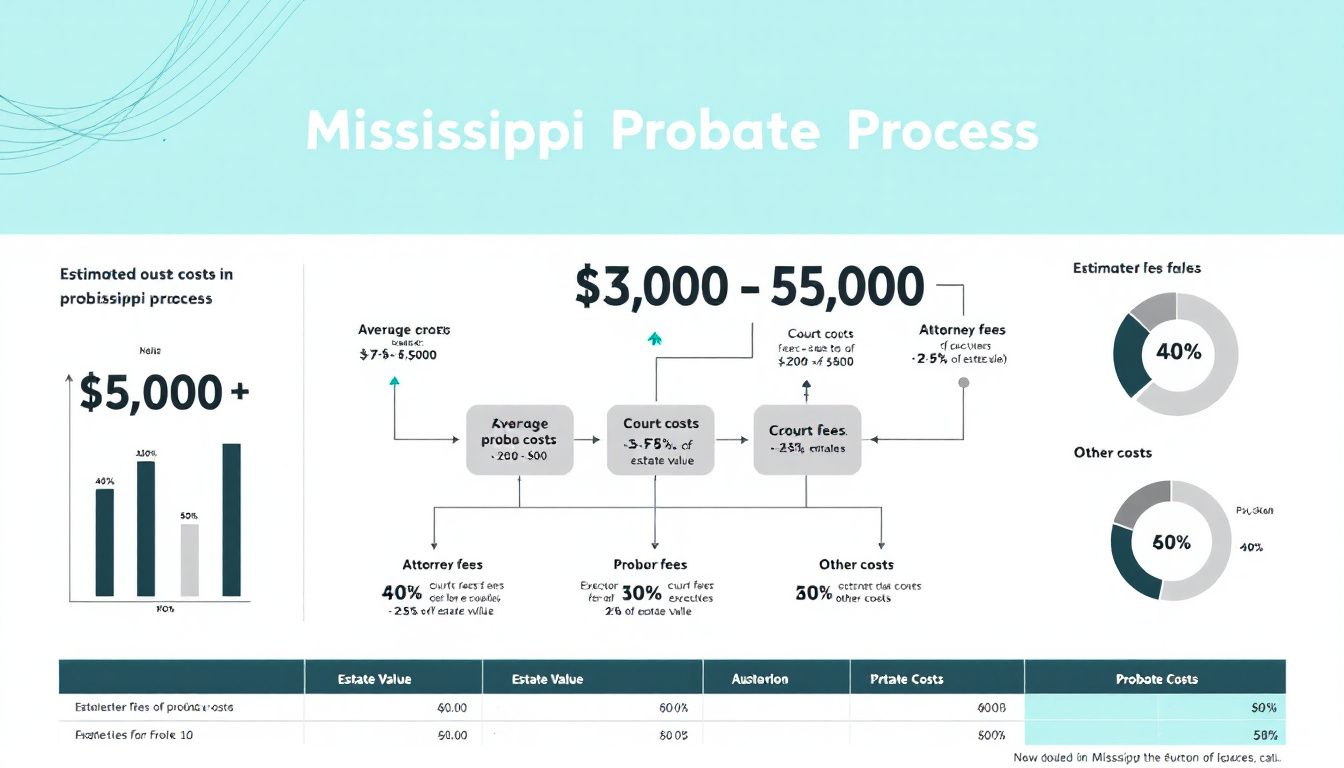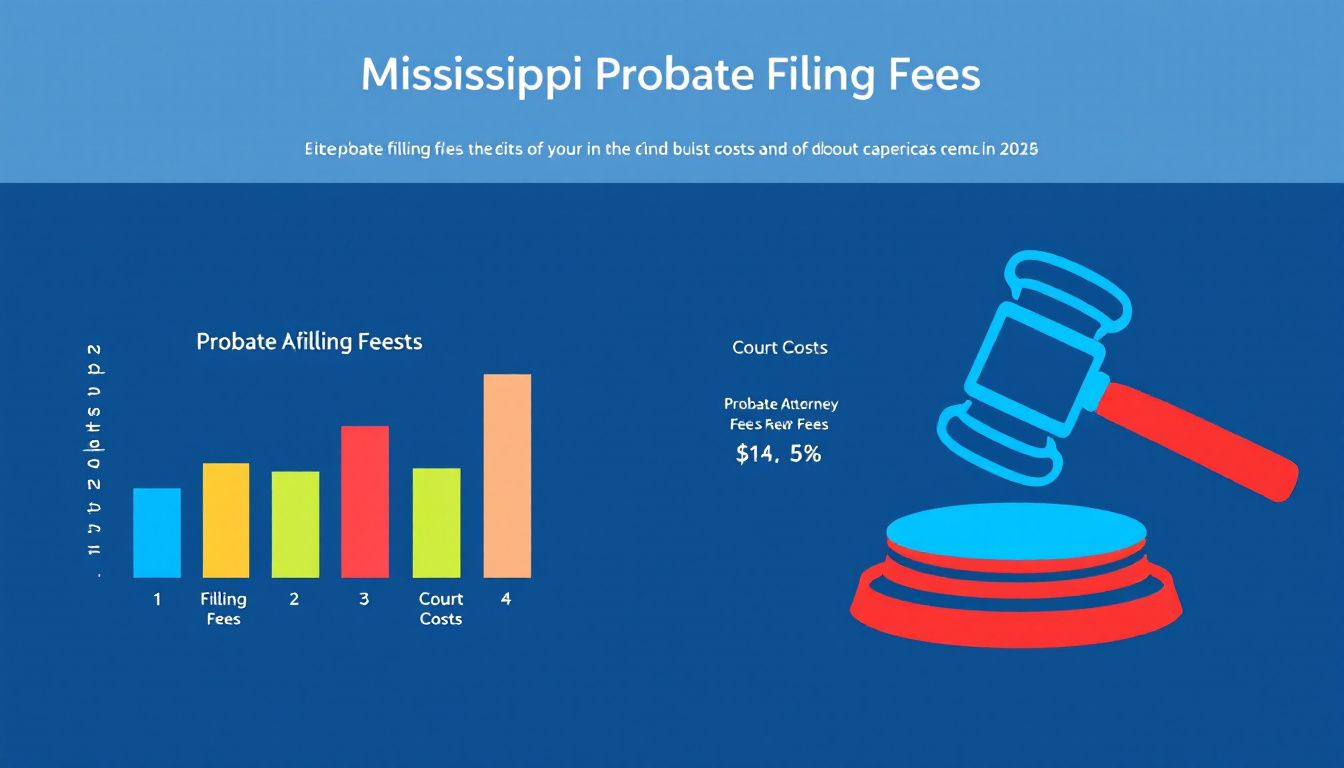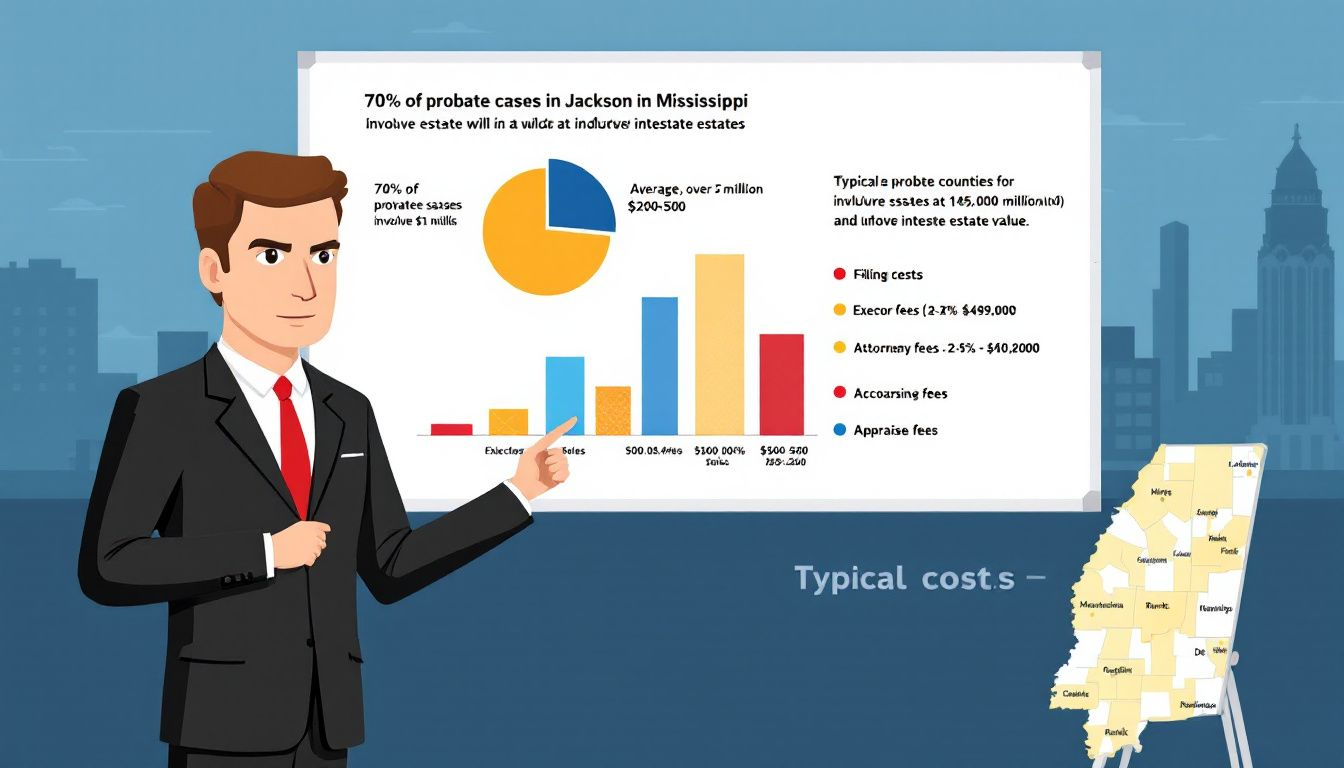Mississippi Probate Costs: How Much Does Probate Cost in Mississippi?
If you’re wondering how much does probate cost in Mississippi, the short answer is that it varies based on several factors. However, you can expect to encounter court filing fees starting at around $148, along with attorney, executor, and appraisal fees. Understanding how much does probate cost in Mississippi in more detail can help you better prepare for the probate process.
Key Takeaways
- Probate costs in Mississippi include court fees, attorney fees, and other expenses that can significantly impact inheritance value, varying based on estate size and complexity.
- Strategies like establishing living trusts and utilizing simplified probate for smaller estates can reduce costs and streamline asset distribution for heirs.
- Proactive estate planning is crucial to avoid high probate costs and ensure a smoother transition of assets, while common mistakes can exacerbate expenses and delays.
Understanding Probate Costs in Mississippi

Probate costs in Mississippi can be a complex web of expenses that include court fees, attorney fees, and various professional fees required during the probate proceedings. These costs are typically borne by the estate, which means they directly impact the value of the inheritance received by the heirs. The size and complexity of the estate, as well as whether the will is contested, can lead to significant variations in these costs.
The financial implications of the formal probate process can be substantial. For instance, if the estate is large or involves numerous assets, the costs can quickly add up, reducing the amount that ultimately reaches the heirs. Understanding these costs and planning accordingly can help mitigate their impact and ensure a smoother transition for your loved ones.
Court Filing Fees in Mississippi Probate

When initiating the probate process in Mississippi, one of the first expenses you’ll encounter is the court filing fee. The base fee for probate cases typically starts at $85, with an additional statutory mandated fee of $57.50, bringing the total for uncontested cases to around $148. These fees must be paid at the time of filing, and the accepted payment methods include cash, money orders, cashier’s checks, or credit cards.
Beyond these initial fees, there are additional costs associated with the publication of legal notices, which are required to inform creditors and potential heirs of the probate proceedings. The costs for these notices can vary depending on the local newspaper’s rates, adding another layer to the overall probate cost. In cases where disputes arise among heirs, additional court hearings may be necessary, further increasing the total expenses.
The range of court filing fees in Mississippi can vary significantly, from as low as $50 to as high as $1,200, depending on the specifics of the case and the estate’s size. Knowing these potential costs in advance can aid in preparing for the financial demands of probate.
Attorney Fees in Mississippi Probate

Attorney fees are another significant component of probate costs in Mississippi. These fees can vary widely based on factors such as the estate’s value, complexity, and whether the attorney charges a flat fee or a percentage of the estate’s value. In Mississippi, probate attorney fees can cover various expenses, including certified mail costs to notify heirs and creditors, as well as publication fees for probate notices in local newspapers.
These legal fees are typically bundled into the overall cost of the probate process, making it crucial to understand what services are included. Awareness of these costs allows for better financial planning, ensuring efficient and effective estate handling.
Factors Influencing Attorney Fees
Several factors can influence the attorney fees in Mississippi probate cases. One of the most significant factors is the size of the estate. Larger estates generally require more work, leading to higher attorney fees. The complexity of the estate, including any disputes over the will, can also drive up costs.
The experience level of the probate attorney is another crucial factor. More experienced attorneys typically charge higher rates, reflecting their expertise and the quality of service they provide. Understanding these factors can help you choose an attorney who offers the right balance of cost and expertise for your needs.
Executor Fees and Compensation
In Mississippi, executors are entitled to compensation for their time and effort in administering the estate. The compensation is governed by a statutory fee schedule that considers the estate’s value and complexity. This means that larger and more complex estates will result in higher executor fees.
Executors also have the flexibility to waive their fees or accept lower compensation, which can be beneficial for tax purposes since executor fees are taxable. Knowing the fee structure and available options enables executors to make informed decisions benefiting both themselves and the estate.
Appraisal and Valuation Costs
Appraisal and valuation costs are often necessary to accurately determine the value of certain assets within the estate. Professional appraisals can vary significantly in cost, depending on the type of asset and its complexity. For instance, real estate often requires specialized appraisers to assess its market value.
These appraisal costs can add to the overall legal fees, making it essential to budget for these expenses when planning the probate process. Accurate appraisals ensure that the estate is valued correctly, which is crucial for fair distribution among heirs.
Additional Probate-Related Costs
Beyond the more obvious costs, there are additional expenses that can arise during the probate process. One such cost is obtaining a death certificate, which is often required for various legal and financial transactions. The fees for this certificate can vary by county in Mississippi.
Other miscellaneous costs may include fees for copying documents, postage, and other administrative expenses. These additional costs can add up, so it’s important to factor them into your overall budget for the probate process.
Managing Outstanding Debts and Liabilities
One of the key responsibilities of the executor is managing the deceased’s outstanding debts and liabilities before distributing any remaining assets. Creditors may file claims against the estate, which the executor must address. This process involves notifying creditors and ensuring that all valid claims are paid.
Once all debts and liabilities are settled, the executor can file a petition for the final distribution of the estate’s assets, subject to court approval. This step is crucial for closing the estate and ensuring that the remaining assets are distributed according to the will or state law.
Cost-Saving Strategies in Mississippi Probate

There are several strategies you can employ to minimize probate costs in Mississippi. For small estates valued below $12,500, a simplified affidavit process can be used, avoiding the need for full probate. Additionally, estates worth less than $50,000 do not require probate, significantly reducing associated costs.
Effective estate planning is another crucial strategy for minimizing probate costs. Methods such as establishing living trusts, naming beneficiaries on financial accounts, and utilizing joint ownership with rights of survivorship can help keep assets out of probate. Waiving executor fees can also be beneficial for tax purposes, as these fees are taxable.
By implementing these cost-saving strategies, you can ensure that more of your estate’s value is preserved for your heirs, rather than being consumed by probate expenses.
Comparing Probate Costs Across States
Probate costs can vary significantly from state to state, influenced by factors such as court filing fees, attorney fees, and local regulations. In Mississippi, the costs may differ compared to other states due to varying fee structures and estate size thresholds.
Comparing probate costs in Mississippi with other states provides valuable context for making informed estate planning and administration decisions. This comparison highlights the importance of being aware of state-specific probate laws and regulations.
Importance of Estate Planning to Avoid High Probate Costs
Proactive estate planning is essential for avoiding high probate costs. Establishing a living trust, for example, allows for the immediate transfer of assets to beneficiaries, bypassing probate and maintaining privacy. Joint ownership with rights of survivorship is another effective strategy, enabling automatic transfer of property to surviving owners.
Naming beneficiaries on financial accounts and utilizing transfer-on-death (TOD) designations for securities and vehicles can also help avoid probate. These strategies ensure that your deceased’s assets are distributed according to a deceased person’s wishes without the delays and costs associated with probate.
By addressing asset distribution proactively through effective estate planning, you can significantly reduce probate expenses and ensure a smoother transition for your heirs.
How Long Does the Probate Process Take?
The duration of the probate process in Mississippi typically ranges from six months to a year, depending on various factors such as the size and complexity of the estate. The minimum duration is usually around three months due to the requirement for creditors to submit claims.
In cases where the estate is larger or more complex, the probate process can extend significantly beyond the minimum timeframe. Knowing the typical duration helps anticipate the costs and timeline of estate administration.
Common Mistakes That Increase Probate Costs
Common mistakes can significantly increase probate costs and delay the estate settlement process. Failing to create a will, for example, can complicate probate and lead to higher expenses. Similarly, discrepancies between beneficiary designations and the will can create conflicts and increase legal fees.
Avoiding these mistakes by ensuring proper estate planning and clear asset designation can help reduce costs and streamline the probate process.
Resources for Navigating Probate in Mississippi
Navigating the probate process and the legal process can be challenging, but various resources are available to assist individuals in Mississippi, including the Mississippi probate process and the Mississippi probate code. Organizations such as the Mississippi Center for Justice and the Mississippi Volunteer Lawyers Project offer legal assistance and referrals to pro bono attorneys.
Utilizing these resources can provide essential support and guidance, making it easier to navigate the complexities of the probate process.
Summary
Summarize the key points discussed in the blog post, emphasizing the importance of understanding and managing probate costs. Encourage the reader to take proactive steps in estate planning to minimize expenses and ensure a smoother transition for their heirs.
Frequently Asked Questions
How long does probate take in Mississippi?
Probate in Mississippi typically takes about four to six months for straightforward cases. It’s important to prepare for this timeline when planning your estate.
How much does an estate have to be worth to go to probate in MS?
In Mississippi, an estate valued at less than $50,000 can use an informal probate affidavit, avoiding the need for a court hearing. Estates above this threshold typically require formal probate proceedings.
How much does probate cost in Mississippi?
Probate costs in Mississippi typically range from a few hundred to several thousand dollars, depending on the estate’s size and complexity. Key expenses include court fees, attorney fees, and other associated costs.
What are the court filing fees for probate in Mississippi?
The total court filing fees for uncontested probate cases in Mississippi typically amount to around $148, which includes a base fee of $85 plus a statutory fee of $57.50. Be aware that additional expenses may accrue from publication fees and any necessary court hearings for disputed cases.
How can I minimize probate costs in Mississippi?
To minimize probate costs in Mississippi, consider establishing living trusts, naming beneficiaries on financial accounts, using joint ownership with rights of survivorship, and utilizing small estate affidavits for estates below specific value thresholds. These strategies can significantly streamline the probate process and reduce expenses.








